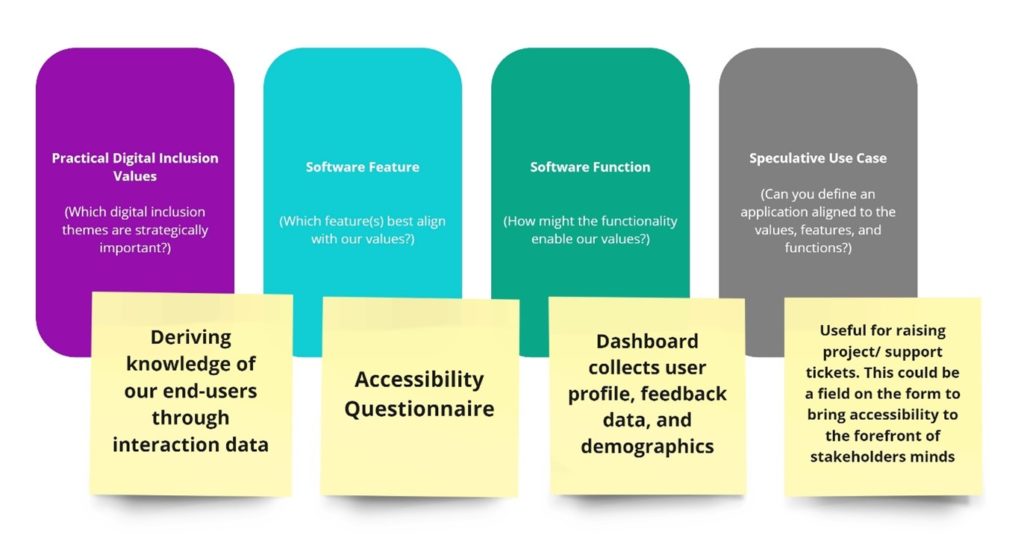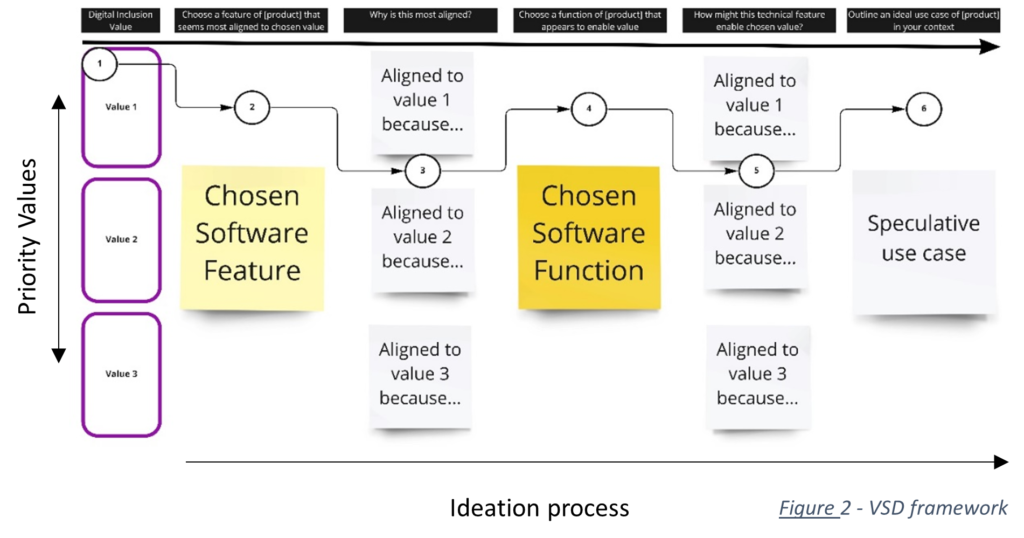post by Oliver Miles (2018 cohort)
Reflections on values orientated ideation as an outreach activity
I previously reflected on my research internship with digital accessibility and mobility start-up ‘CityMaaS’, focussing on the resulting ‘drivers and barriers to digital inclusion’ report and my own experiences of working in the world of start-ups. In this post I’ll focus instead on the leadership and methods I brought to the work – a participatory ideation workshop drawing on principals of values-sensitive design (VSD) [1] – positioning this as a form of outreach to two key stakeholders: CityMaaS as the host organization and corporate professionals as participants.
As an independent researcher embedded with CityMaaS I was asked to critically uncover the drivers and barriers to digital inclusion services across three diverse B2B organizations from financial, healthcare, and higher education sectors that were current or potential clients.

This first entailed understanding the host organization’s perspective on digital inclusion priorities, by listening to CityMaaS software and digital inclusion subject matter experts and building a detailed inventory of their solutions in terms of core features and functions. These would later serve as card-based options and provocations in a collaborative workshop.
Considering participant organizations, I then spoke to heads of web and digital, interviewing them regarding their journeys and priorities regarding digital inclusion, with a view to uncovering core themes which could be positioned as corporate ‘practical values’ [2]. These were presented alongside software features and functions in later ideation workshops for wider web and digital teams to participate in, with a view to articulating speculative use cases.
In the example above, participants reason that the accessibility questionnaire feature of the web-page personalization tool ‘Assist Me’, considering its user data dashboard functionality, might be applied to the everyday internal practice of raising support tickets for the end-users. Conceivably, this might fulfil the chosen practical value of ‘deriving knowledge of end-users through their interaction data’ (Figure 1).
This process was repeated for three practical values chosen as priority issues across three existing software solutions using a card-based framework inspired by VSD, presented in Miro[1] (Figure 2). This resulted in a final ‘wildcard’ digital inclusion software solution being incrementally articulated, tailored to the needs of the participant. Aside from these research output, I would outline the following two benefits of the approach I took as relevant to outreach objectives.
Sharing a replicable, inclusive methodology: The VSD ideation workshop is inclusive as a practice, and in terms of the method, and can easily be reappropriated in future projects requiring participatory or deliberative approaches.
Advocating for an important equality, diversity, and inclusion issue: I was able to participate in CityMaaS’ broad stated agenda of improving ‘…the way the disabled community consumes accessibility data and services’ by contributing to raising corporate awareness of the challenges of web-accessibility, digital mapping and real-world navigation, and alignment to global web-accessibility standards [3]. As participatory methods emphasise the importance of all stakeholders working toward a shared objective, which in this case was ‘journeys to digital inclusion’, I felt this enabled constructive interactions that did not conflict with my ability to critically reflect on strengths and weaknesses in either the participant’s responses, or CityMaaS’ offering more broadly.
References
[1] T. Winkler and S. Spiekermann, “Twenty years of value sensitive design: a review of methodological practices in VSD projects,” Ethics Inf Technol, vol. 23, no. 1, 2021, doi: 10.1007/s10676-018-9476-2.
[2] T. Nilsson, J. E. Fischer, A. Crabtree, M. Goulden, J. Spence, and E. Costanza, “Visions, Values, and Videos: Revisiting Envisionings in Service of UbiComp Design for the Home,” 2020, doi: 10.1145/3357236.3395476.
[3] CityMaaS, “Homepage,” https://www.citymaas.io/, Jun. 03, 2022.

